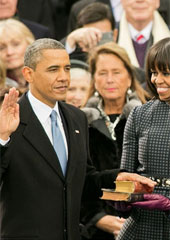Climate Change and the Claim to Global Leadership
What is the real challenge President Obama and the American people must urgently resolve?
January 22, 2013

The global essence of the United States of America, from its very beginning, has been that it, more than any other nation, encapsulated the forces of modernity and progress. From its innate optimism to its open embrace of technology, tempered by a strong sense of pragmatism, it was the country that led the world forward.
However, the country now faces the end of that powerful narrative arc of history. The current recessionary environment is viewed as one where pursuing fundamentally new, modernizing choices — such as dealing determinedly with the issue of climate change — is viewed as impossible, or at least ill advised.
The country that excelled with an all-hands-on-deck effort to race to the moon keeps its head in the sand on more earthly matters. Instead, it revels in such modern reincarnations of past comfort zones as the shale gas “revolution” and energy independence.
What is important to realize is that, in a global context, this policy choice entails a very real price regarding the reputation of the United States. A country that sees itself as the global leader but is incapable or unprepared to lead by taking a decisive stand on tackling the true long-term legacy issue of our time — climate change — loses that claim to global fame and status.
Even in a 2012-13 winter season, which is shaped by the twin curiosity of the once mighty Mississippi River drying up and snowfall in the state of Mississippi, Americans prefer not to wake up from their deep sleep.
Other advanced countries have to contend with the effects of the recession just as much. And as the world cannot escape but noticing, the uncharacteristic American caution on the environment is not the only way in which the United States has displayed a trend toward becoming anti-modern, if not archaic.
Take gun control. In a modern and civilized nation, gun control should not even be a matter of debate. The properly strict regulation of the gun-toting instinct is only natural in any mass society. No wonder the rest of the world looks on in amazement.
People outside the United States have a hard time understanding that many Americans find that their government is already “intrusive enough” and “imposes high costs.” Neither of which, of course, is the case — at least if compared to other developed countries’ governments.
What the world therefore sees when it looks at the United States is not so much a beacon of freedom as a country that is shoving aside the responsibilities that are part and parcel of modern civilization.
This changed global landscape also gives a new meaning to who really has a free-rider mentality in the 21st century. Americans have long claimed that it is the Europeans who ride on the tails of American defense expenditures.
That favor is now being returned as Americans shy back from making the investments required to bring about the global energy transformation.
Whatever the case may have been on that issue, defense in the military sense is for the most part an issue of the last century. Defense in this century, and from hereon out, has shifted to planetary defense.
The new battle is all about defending the ability of humans to keep on living on this planet in climate conditions to which they can comfortably adapt.
What about the notion of affordability? Given Americans’ wasteful standard of living, it cannot be a matter of a lack of resources that drives Americans to persist in being a nation of free riders on the environment.
What about the jobs crisis as a deterrent to making a bet on the environment?
Perhaps the most succinct statement that can be made on this counterargument is that — owing to its own long-standing preference for optimism and the can-do spirit — Americans previously have always been willing to make big bets. It was that uncanny ability and courage that set them apart.
Of course, this is not an effort in which any special responsibility falls on the United States. We live in an increasingly leaderless world, to a considerable degree because of the self-incapacitation of the United States.
In such a world, every nation has to play its role and make a contribution. So does the United States. Pointing to the beauty and vastness of its land, the many green valleys and blue rivers, as well as its relatively low population density, is not an adequate answer.
The implication is that the environment really is a pressing concern mostly in the much more densely populated environs of Europe and Asia. Therefore, let them deal with the issue. We cannot worry about everything.
The United States as an Anti-Modernity Force is a five-part series by Stephan Richter on the United States’ inability to play a leading role in the global debate on climate change:
1. Climate Change and the Claim to Global Leadership
2. Optimism as a Force for Good — And Doing Nothing
3. The U.S. Refusal to See China as a Positive Challenge
4. Yearning for Systemic Uncertainty
5. Turning Environmental Threats into Profits
Takeaways
American optimism is in danger of morphing into a fateful combination of blind optimism and abdication of civic responsibilities.
U.S. conservatives have a blinding belief in technology as a panacea. So does Silicon Valley, the "it" boys (yes, almost exclusively boys) of invention and innovation.
Technological breakthroughs are assumed to happen just in time — to avoid painful tradeoffs for society.
All it takes is American leadership. Once U.S. business and technologists turns their mind to something, they will lead the world — by definition (or prophecy).

